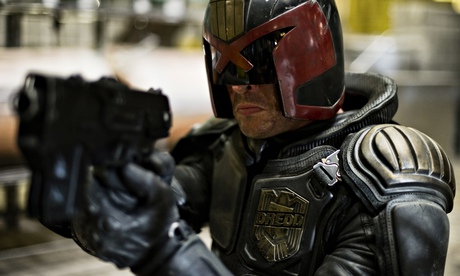
In a world in which we are apparently to get a full half-dozen Guy Ritchie-directed King Arthur movies, it’s a mystery that no one in Hollywood has seen fit to cough up the greenbacks for a single Dredd sequel. Pete Travis and Alex Garland’s 2012 adaptation of the 2000AD comic strip about an implacable future cop who lives to fight crime on the streets of the sci-fi metropolis Mega-City One has attained the status of a bona fide cult classic in record time. It’s one of the rare genre movies that bears regular rewatching; a film as muscular and unyielding as its justice-dispensing, Lawgiver-wielding subject.
Karl Urban, aka Judge Dredd himself, has been the main cheerleader for the idea of a follow-up. This week, at Chicago Comic-Con, he revealed that it could become a reality, and that it might take the form of a prequel, based on the 2006 Origins storyline by Dredd’s original creators John Wagner and Carlos Ezquerra. “There is a definite possibility [of a sequel],” Urban teased. “But, it is more likely that we will do the origins story with Dredd trekking through the Cursed Earth to find the first Chief Judge Fargo.”
Adapting the Origins storyline in some way would make a huge amount of sense. If there is one fault with Travis and Garland’s film, it is the lack of back-story about the world Dredd inhabits. That and a failure to include some of the quirkier examples of future weirdness that regularly find their way into the pages of the comic book. Screenwriter Garland clearly felt that diving too far into the ultra-crazy world of Mega-City One would confuse all but 2000AD aficionados, and so wrote a straight-to-the-point futuristic crime thriller in the hope of fleshing out the story in later instalments.
Which is fair enough, but any prospective sequel needs to bring the big-screen Dredd gently and carefully back into line with his iconic print counterpart. While the movie only made around $35m (£22m) at the global box office, failing to make back its $50m (£30m) budget, the film’s growing standing as one of the great comic-book adaptations of the 21st century (and its huge success on DVD and on-demand services) requires producers to begin to dig into the mythos.
Origins was Wagner and Ezquerra’s attempt to tell the story of how Mega-City One and the Judge system (d)evolved from the democratic United States of America in the early part of the 21st century. In the story, which ran in 2000AD for 23 episodes beginning in 2006, Dredd is charged with journeying into the Cursed Earth, the bombed out, post-apocalyptic centre of the former US, where humanity does its best to survive in irradiated, mutant-ridden badlands. Here, Dredd hopes to ransom Chief Judge Fargo – the creator of the Judge system and Dredd’s own clone-technology “father” – who is being held hostage, despite the public having been told that he died many decades earlier.
Without wishing to give too much away, it turns out that another famous figure believed to have been wiped from the pages of Dredd history has played a part in the kidnapping, leading to a climactic battle. Along the way, Dredd bumps into a family of mutants whom he discovers share his own bloodline. Mega-City One’s top lawman also recounts the history of the metropolis of 800 million people to the small band of Judges who have accompanied him on his mission.
The comic book, with its mixed bag of mutants and maniacal politicians, is perhaps too far out to stand a direct transfer to the big screen. It’s a panoramic, expansive story that would in many ways be the opposite of Dredd, which made much of dealing with a single routine day in the life of its subject. It might even be that producers need to tone down the more outlandish aspects of the Cursed Earth scenes, or abandon the main storyline altogether, in order to make a movie more in keeping with the perfectly formed but limited cinematic universe that Travis and Garland created two years ago.
But that widescreen historical backstory, told in flashbacks, deserves to be seen in multiplexes. Using it would signal the sort of confidence in their material on the part of the film-makers that served Peter Jackson so well in the making of his hugely successful Lord of the Rings trilogy.
It’s also the kind of ambitious expansion of the story that, in the worst case scenario, could lead to chronic mythos-bloat. But audiences might just as easily find themselves warming to the fascinating Dredd universe and desperate for further instalments. All in all, it seems like a risk well worth taking.

